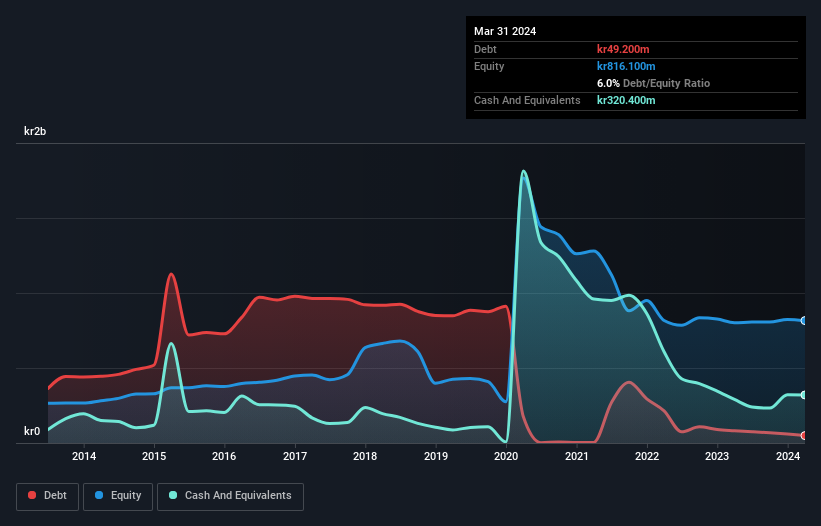
The external fund manager backed by Berkshire Hathaway's Charlie Munger, Li Lu, makes no bones about it when he says 'The biggest investment risk is not the volatility of prices, but whether you will suffer a permanent loss of capital.' When we think about how risky a company is, we always like to look at its use of debt, since debt overload can lead to ruin. We note that Concejo AB (publ) (STO:CNCJO B) does have debt on its balance sheet. But is this debt a concern to shareholders?
When Is Debt A Problem?
Debt assists a business until the business has trouble paying it off, either with new capital or with free cash flow. If things get really bad, the lenders can take control of the business. However, a more common (but still painful) scenario is that it has to raise new equity capital at a low price, thus permanently diluting shareholders. Of course, debt can be an important tool in businesses, particularly capital heavy businesses. When we examine debt levels, we first consider both cash and debt levels, together.
Check out our latest analysis for Concejo
How Much Debt Does Concejo Carry?
The image below, which you can click on for greater detail, shows that Concejo had debt of kr49.2m at the end of March 2024, a reduction from kr82.1m over a year. But it also has kr320.4m in cash to offset that, meaning it has kr271.2m net cash.

How Healthy Is Concejo's Balance Sheet?
The latest balance sheet data shows that Concejo had liabilities of kr203.8m due within a year, and liabilities of kr55.8m falling due after that. Offsetting this, it had kr320.4m in cash and kr152.7m in receivables that were due within 12 months. So it actually has kr213.5m more liquid assets than total liabilities.
This excess liquidity is a great indication that Concejo's balance sheet is almost as strong as Fort Knox. Having regard to this fact, we think its balance sheet is as strong as an ox. Simply put, the fact that Concejo has more cash than debt is arguably a good indication that it can manage its debt safely.
Although Concejo made a loss at the EBIT level, last year, it was also good to see that it generated kr67m in EBIT over the last twelve months. There's no doubt that we learn most about debt from the balance sheet. But it is Concejo's earnings that will influence how the balance sheet holds up in the future. So when considering debt, it's definitely worth looking at the earnings trend. Click here for an interactive snapshot.
Finally, while the tax-man may adore accounting profits, lenders only accept cold hard cash. While Concejo has net cash on its balance sheet, it's still worth taking a look at its ability to convert earnings before interest and tax (EBIT) to free cash flow, to help us understand how quickly it is building (or eroding) that cash balance. Over the most recent year, Concejo recorded free cash flow worth 66% of its EBIT, which is around normal, given free cash flow excludes interest and tax. This cold hard cash means it can reduce its debt when it wants to.
Summing Up
While we empathize with investors who find debt concerning, you should keep in mind that Concejo has net cash of kr271.2m, as well as more liquid assets than liabilities. And it impressed us with free cash flow of kr44m, being 66% of its EBIT. So is Concejo's debt a risk? It doesn't seem so to us. When analysing debt levels, the balance sheet is the obvious place to start. But ultimately, every company can contain risks that exist outside of the balance sheet. For example, we've discovered 3 warning signs for Concejo that you should be aware of before investing here.
If you're interested in investing in businesses that can grow profits without the burden of debt, then check out this free list of growing businesses that have net cash on the balance sheet.
New: AI Stock Screener & Alerts
Our new AI Stock Screener scans the market every day to uncover opportunities.
• Dividend Powerhouses (3%+ Yield)
• Undervalued Small Caps with Insider Buying
• High growth Tech and AI Companies
Or build your own from over 50 metrics.
Have feedback on this article? Concerned about the content? Get in touch with us directly. Alternatively, email editorial-team (at) simplywallst.com.
This article by Simply Wall St is general in nature. We provide commentary based on historical data and analyst forecasts only using an unbiased methodology and our articles are not intended to be financial advice. It does not constitute a recommendation to buy or sell any stock, and does not take account of your objectives, or your financial situation. We aim to bring you long-term focused analysis driven by fundamental data. Note that our analysis may not factor in the latest price-sensitive company announcements or qualitative material. Simply Wall St has no position in any stocks mentioned.
About OM:CNCJO B
Concejo
Designs, manufactures, and supplies fire safety products and systems.
Flawless balance sheet and slightly overvalued.
Market Insights
Community Narratives



